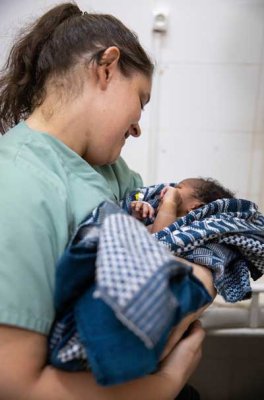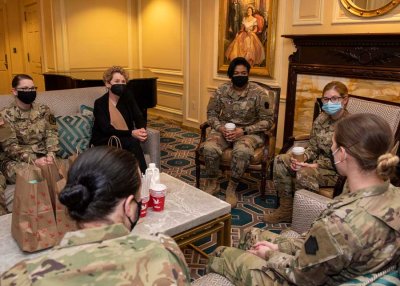Expectant Service Members Lack Support. Doulas Could Help, Advocates Say.
Gaby Cavins entered her military treatment facility on a Friday afternoon in February 2017 for a prenatal checkup. A lieutenant, junior grade, in the Navy, she was 25, healthy, and a week past her due date. She wanted to wait for natural labor to begin, but after an ultrasound, she was told her amniotic fluid was low and she couldn’t leave the hospital. Medication used to kick-start contractions didn’t have an immediate effect. So she walked lap after lap in hospital hallways to try to induce labor.
Hospital staff took notice, and made for her a checkered flag, she says, as if she were a stock car.
On her loops, she occupied herself by counting women who had delivered their babies ahead of her: one, two, three... .
By Saturday night, her count was close to 10.
Finally, early Sunday morning, she delivered her son, Kenneth, and she held her soft, squeaking newborn on her chest. But she soon asked her husband to lift him off as she wasn’t sure it was safe to hold him. Cavins was bleeding severely. A nurse or attending physician had tugged on her umbilical cord to speed up her placenta’s delivery, she says, tearing the placenta and damaging her cervix.
“Am I going to die?” she asked a medical student who was in the room observing her delivery, and who was now holding her hand.
The days-long ordeal was not how she envisioned her first birth. She wanted the least amount of medical intervention possible. A retired Navy family doctor with decades of experience tells The War Horse that admitting a patient with low amniotic fluid and inducing labor is standard care. Without enough fluid, the fetus can struggle to breathe.
Still, Cavins wonders how her first delivery might have unfolded if she had been given options, like birthing at home, at a hospital of her choice, or with a doula, a nonmedical provider who offers prenatal and perinatal support. But because she was on active duty, she had to deliver at her military treatment facility—which she doesn’t want to name publicly—for TRICARE, the health care program for uniformed service members, to cover the costs.

U.S. Army Staff Sgt. Christina Fontaine, a doula with the Vermont National Guard, soothes a days-old newborn in February during a medical readiness exercise in Senegal. Photo by Cpl. Alisha Grezlik, courtesy of the U.S. Army.
TRICARE does not cover birth doulas for active-duty women, though expectant service members often live far away from family or may have a deployed partner, leaving them with no one to advocate for or support them as they give birth.
While news about access to abortion care has dominated this year’s defense bill, a handful of congressional leaders and advocates have also focused on expanding the childbirth side of reproductive rights. Senate and House versions of the 2024 National Defense Authorization Act include language that will require TRICARE to cover doulas for expectant service members, and advocates hope this is the first step toward TRICARE covering delivery options, including home births, outside military treatment facilities.
“Just getting a doula in the room is huge,” says Natalie Winkels, a civilian birth doula, mother of three, and 17-year Air Force veteran who works as a Department of Air Force gender adviser.
That extra support, advocates say, is especially critical for younger service members who may not feel comfortable questioning their medical team.
“I’ve had a lot of junior sailors tell me that they felt like they couldn’t speak up, because their nurse or their [obstetrician] or midwife was higher ranking than them,” Cavins says.
And that deference can play a part in every other reproductive decision a woman makes in the military—because women may fear asking advice on basic issues like child care or postpartum depression. But it can also affect how women’s health issues are seen by the military: If women don’t feel comfortable talking about their concerns, those concerns don’t make it up the chain of command. That’s a problem because, as the services face a recruiting crisis, they need to retain women service members.
Award-Winning Journalism in Your Inbox
Over the course of several weeks, The War Horse heard stories of service members being unable to access or afford child care, as well as women being asked to return to work the day after a pregnancy loss with little thought given to their mental and emotional health. While the Air Force and Army have convalescent leave policies after pregnancy loss, the Navy leaves it up to a medical provider to determine whether time off is needed, and the Marines let commanders and medical providers decide.
Shanti Sethi, a recently retired Navy captain who was the only Indian American woman to command a major U.S. combat warship, had to terminate her first pregnancy in 2012 at eight weeks because it was ectopic. Though only two months in, the heartbreak took her two years to fully recover from, especially because, after a bout with infertility, her hope of finally becoming a mother hung on this pleasant surprise, she says.

Capt. Shanti Sethi, commodore, commander, Task Force 64, right, observes with Angus Young as the Arleigh Burke-class guided-missile destroyer USS Winston S. Churchill gets underway Sept. 23, 2017. Photo by Mass Communication Spc. Seaman Apprentice Raymond Maddocks, courtesy of the U.S. Navy.
“I really feel like if we were able to talk about it more, and if maybe your convalescent leave came with some sort of information on mental health,” she says, “there would be a better understanding.”
It’s only within the last few years that pregnant service members have had greater access to short-term maternity uniforms, rather than having to buy their own, and parental leave policies were expanded to 12 weeks—the amount of time ensured by the Family and Medical Leave Act of 1993. And a recent survey of 30 pregnant active-duty Air Force members found they often felt colleagues perceived them as lazy and weak, while several studies have shown active-duty women who want to become mothers often leave the service because of the demands of their careers and trouble finding child care.
If the military values retaining women, all branches need to better accommodate those who want children, Cavins says.
“In mothers, in particular, we see a huge drop-off,” she says.
‘Giving Birth Is Expensive’
The Military Health System is a descendant of medical systems created to treat war-related wounds as far back as the Revolutionary War, but now serves 9.5 million service members and their dependents. Today, childbirth ranks as the system’s most common procedure. In 2021, nearly 98,000 live births occurred in the Military Health System, and active-duty service members accounted for a little more than 15,000.
But in 2021, women made up just 17% of the active-duty force—or about 232,000 people. When fewer than one out of five service members are women, and only about 6% of them have babies each year, maternal needs may not be the first thing on a commander’s mind.
The women themselves don’t often have a choice, even beyond being able to use a doula, of what kind of care they receive.
In 2021, about 6,000 active-duty service members delivered at a private care hospital—either because the military clinic or hospital didn’t have the resources to deliver the baby or the individual could pay for the delivery without insurance, a cost that can exceed $20,000.
Sethi wanted to give birth to her now-seven-year-old daughter “so badly” in a birthing center staffed by midwives, rather than a military treatment facility that she says felt too clinical, too severe. But she had already spent tens of thousands of dollars on fertility treatments and an embryonic transfer, and she needed insurance to cover the delivery.
“Giving birth is expensive,” she says. “It was just impossible to find a way to do it.”
Military care itself is generally pretty good: While military spouses have the choice to deliver in a community hospital or military treatment facility, thousands of them choose military care. That may be because maternal and infant outcomes at military hospitals often exceed those of private hospitals.
Over a period of almost 10 years, the pregnancy-related mortality rate for military facilities was about 3 deaths per 100,000 live births, according to a 2019 Congressional report—far fewer than the about 11 deaths per 100,000 live births in hospitals that report to the National Perinatal Information Center, a voluntary database that tracks obstetric quality. Infant mortality rates are also lower in military facilities than NPIC hospitals.
Still, postpartum hemorrhage rates have historically been higher at military hospitals than certain civilian hospitals, though improvements have been made in recent years. And while the Military Health System cesarean birth rate of about 24% is lower than the national rate of nearly 32%, it’s still higher than the 15% to 19% rate identified as an optimal rate for developed countries.
For service members, long recoveries from cesarean deliveries can impact their ability to return to active duty.
The military is unique in the United States in that it offers all pregnant service members the same universal health care. Still, recent studies indicate that Black and Asian American active-duty women are at higher risk for death or complications during birth at military treatment facilities—inequities that have long plagued pregnant women of color across the United States.
‘There Would Be a Better Understanding’
The retired Navy family doctor, who spoke to The War Horse on the condition of anonymity, says the Military Health System plays a critical role in military readiness. Without a full patient load, doctors across the spectrum of specialties can’t keep their skill sets fresh. Though births rarely occur during a wartime deployment, public health missions take military doctors all over the world. He once delivered a baby in the jungle while administering vaccines, he says.
But if active-duty women want to deliver their babies off installation, and if advocates push for that right in upcoming defense bills, it’s critical for Military Health System officials to listen to them and to try to figure out why they’re choosing to go elsewhere, he says.
Military women themselves say the reasons vary—but that an advocate, like a doula, who could talk a 20-year-old soldier or a 30-year-old Marine through workplace stereotypes about not pulling one’s own weight, or what they’re eligible for after a pregnancy loss, or how to find child care could be enough to keep them in the services.
Amanda Dodson, a military spouse and doula who founded the Military Birth Resource Network and Postpartum Coalition, has witnessed many lower-ranking service members refer to their provider as sir or ma’am or use their official rank, she says, which is “what they’re taught to do in the military.” That means they may not question their care or ask questions—they simply do as they’re ordered.

Dominique Hunter, the Military Breastfeeding Network active- duty director, explains doula and breastfeeding options to new moms at a Womack Army Medical Center maternity fair at Fort Liberty, North Carolina, in 2018. Photo by Twana Atkinson, courtesy of the U.S. Army.
As in the civilian world, higher pay affords more choice to expectant moms. Winkels paid for the home births of her three children out of pocket, forgoing TRICARE’s fully covered option at a military treatment facility. Based on her experiences, she says doulas will help younger service members advocate for themselves as they near delivery.
After Kenneth’s difficult birth, Cavins was left traumatized, she says, suffering from intense anxiety and struggling to access consistent mental health therapy, a common refrain in the Armed Forces. According to a recent RAND Women’s Reproductive Health survey, about half of active-duty service women who had recently given birth reported depression during or after their pregnancy, with fewer than half of those seeking care.
A few years later, and pregnant with her second child, Cavins felt torn. Though she enjoyed her years as a surface warfare officer, senior leadership told her the decision to have children had effectively stalled her career, she says. On Nov. 18, 2020, she requested to resign from active duty.
‘Let Me Get the Help I Need’
The proposed solutions aren’t simple, advocates say.
In 2021, after several years of advocacy by military-connected mothers and their allies in Congress, the Defense Department implemented a congressionally mandated pilot project that would evaluate the benefits of maternal and fetal outcomes if TRICARE covered certified labor doulas. The “Extramedical Maternal Health Providers Demonstration Project” also enhanced breastfeeding support.
The Defense Health Agency found that “doula services might have a positive impact on shortened duration of labor, decreased epidural anesthesia, decreased anxiety during labor, decreased rate of stillbirths and low Apgar scores in infants,” according to the official notice that established the project in the Federal Register. Some studies have also connected the presence of doulas with a decreased likelihood of cesarean deliveries. Medicaid reimburses doulas for their services in nine states, including Oregon, Minnesota, Nebraska, and Indiana, as well as Washington, D.C., with other states considering legislation.
Rep. Chrissy Houlahan, a Democrat from Pennsylvania and an Air Force veteran, was among the congressional leaders who pushed for TRICARE to cover doulas. But unknown to Houlahan and others in Congress, language included in the Federal Register excluded active-duty service members who give birth at military treatment facilities from the project. In other words, TRICARE would not cover doulas for them. Aubrey Stuber, a spokesperson for Rep. Houlahan, says this year’s defense bill aims to fix that oversight.

Congresswoman Chrissy Houlahan, with Pennsylvania’s Sixth Congressional District, visits with female Pennsylvania National Guard members to discuss inclusion and leadership for women in the military in Washington, D.C., March 2, 2021. Photo by Senior Airman Zoe M. Wockenfuss, courtesy of the U.S. Air National Guard.
Cavins, who is executive director of the Military Birth Resource Network and Postpartum Coalition, a nonprofit that supports and advocates for expectant military families, says more changes are needed, largely due to all the bureaucratic red tape that makes it difficult for doula providers to work with TRICARE. While, as of 2018, 100 agencies certify and train doulas, TRICARE accepts doulas certified through only five programs.
And Dodson, the military spouse and doula, says TRICARE’s reimbursement rate is about half what she is paid through other insurances and private pay, and, as of July this year, she was still waiting for about $800 in reimbursement for services she performed in 2022.
“If you are a doula in your community that has already had your footprint there and you’re already networking, you don’t always need to worry about your clientele,” she says. “You know, you already have a steady flow of people who pay out of pocket, why would you want to go that insurance route and help military families?”
Some doulas also struggle with TRICARE’s difficult coding system, and Cavins says she knows doulas who have dropped TRICARE because of the many challenges.
A February report evaluating the Extramedical Maternal Health Providers Demonstration Project confirmed Dodson’s fears, showing low participation on both the provider and beneficiary side. It blamed a “substantial learning curve” for providers who must tackle billing TRICARE, as well as a shortage of qualified doulas for the dismal first year.
Over the next several months, the defense bill will churn through the committee process before the final version lands on President Joe Biden’s desk.
Our Journalism Depends on Your Support
Advocates say they are confident that the bill to expand doula coverage to active-duty women will make it to the finish line unscathed—unlike the more contentious battle over access to abortion.
On the day The War Horse spoke to Cavins, her 16-month-old, Lyana, blond and rosy-cheeked, fell asleep in her arms as her four-year-old son played behind her. Kenneth, now known as “Kenny,” had been dropped off at first grade. Her two youngest kids were delivered naturally, Cavins says: She gave birth to her middle child two weeks after her due date in a private hospital after resigning from the Navy, while her youngest was born at home.
She says Kenneth’s birth “defined” who she is, and she vows to keep pushing for pregnant active-duty women to have the support and options afforded to many of their civilian counterparts.
“We should be able to say, ‘I want to give birth at home,’” she says. “‘I want to give birth at a birth center. Let me have a doula that is covered that I can afford.
“‘Let me get the help I need.’”
This War Horse feature was reported by Anne Marshall-Chalmers, edited by Kelly Kennedy, fact-checked by Jess Rohan, and copy-edited by Mitchell Hansen-Dewar. Headlines are by Abbie Bennett.





Comments are closed.